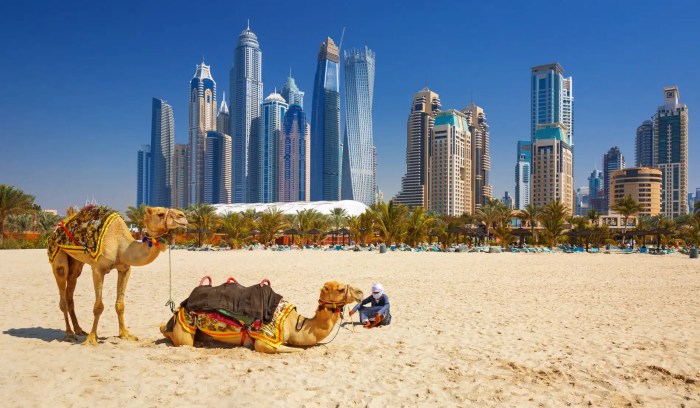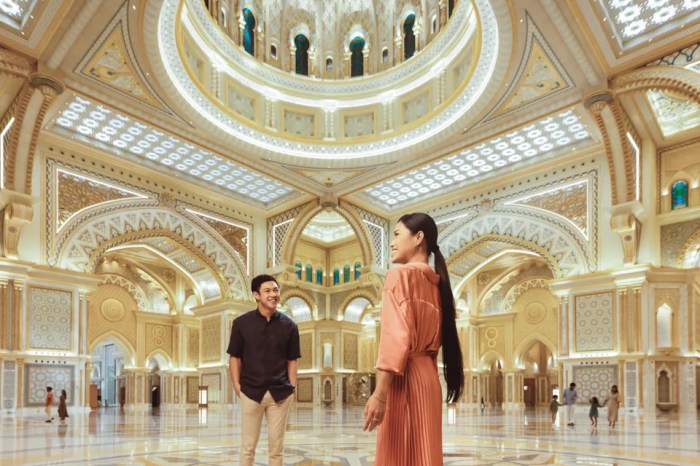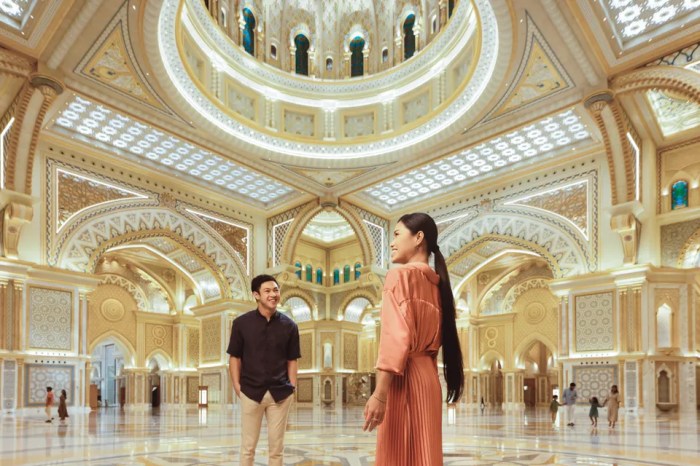Dubai vs Abu Dhabi: Unveiling the captivating differences between these two vibrant emirates. From their historical roots to their bustling modern economies, these neighboring cities offer unique experiences. This comprehensive comparison explores the cultural nuances, infrastructure marvels, economic landscapes, and much more, providing a detailed insight into what sets each apart.
This in-depth look at Dubai and Abu Dhabi delves into the intricacies of each emirate. We’ll explore their distinct cultural identities, contrasting lifestyles, and the key differences in their economies, infrastructure, and tourism sectors. Prepare to discover which emirate best aligns with your interests!
Dubai and Abu Dhabi: A Comparative Overview
Dubai and Abu Dhabi, two prominent emirates of the United Arab Emirates, stand as testaments to the nation’s rapid modernization and economic diversification. While both cities are renowned for their opulent architecture and luxurious lifestyles, key differences in their historical trajectories and current economic focuses create distinct identities. This overview delves into the contrasting characteristics of these vibrant metropolises.
Historical Context
The historical trajectories of Dubai and Abu Dhabi reflect their unique development paths. Dubai, initially a trading hub, witnessed significant growth in the pearl diving and fishing industries. This foundation laid the groundwork for its later transformation into a global commercial center. Abu Dhabi, on the other hand, relied heavily on its oil reserves, which became a defining characteristic of its economic evolution.
This historical difference continues to influence the current economic landscapes of the two emirates.
Economic Landscape
Dubai has successfully diversified its economy beyond oil, focusing on tourism, trade, and financial services. Its strategic location and ambitious infrastructure projects have attracted global investment and businesses, making it a significant player in the global economy. Abu Dhabi, while maintaining its oil-based economy, has also invested heavily in diversifying its economy through sectors like advanced manufacturing, research and development, and renewable energy.
This diversification strategy aims to mitigate the dependence on oil revenue and position the emirate for future growth.
Demographic Comparison
| Characteristic | Dubai | Abu Dhabi |
|---|---|---|
| Population (approx.) | 4.5 million (2023) | 2.8 million (2023) |
| Ethnic Composition | Diverse, with significant expatriate populations from South Asia, Africa, and other regions. | More diverse than initially thought, but with a higher proportion of Emirati citizens. |
| Age Distribution | Relatively young, reflecting the high influx of migrant workers. | More balanced age distribution, with a higher proportion of older citizens. |
| Urbanization | Highly urbanized, with a significant population concentrated in the city center and surrounding areas. | Urbanization is occurring, but less concentrated than in Dubai. |
The table above provides a concise comparison of the demographic characteristics of the two emirates. The differences highlight the unique factors driving the population distribution and composition in each emirate. Dubai’s status as a major international trade hub, and its significant reliance on expatriate labor, directly affects its demographic profile. Abu Dhabi, on the other hand, while also attracting foreign investment and workers, has a more balanced demographic profile due to its relatively greater concentration of Emirati citizens.
Culture and Lifestyle
Dubai and Abu Dhabi, though both part of the UAE, exhibit distinct cultural identities shaped by their historical trajectories and contemporary priorities. While both embrace modernity, their approaches to tradition and social norms reflect the nuanced differences between the two emirates. This exploration delves into the contrasting cultural landscapes, examining social norms, entertainment, and culinary traditions.The evolution of Dubai, heavily influenced by its role as a trading hub, has fostered a more cosmopolitan and fast-paced lifestyle.
Abu Dhabi, rooted in its historical significance and oil wealth, maintains a slightly more traditional and reserved ambiance. These differences are perceptible in their respective social norms, entertainment options, and even the culinary experiences.
Cultural Identities
Dubai’s culture is characterized by its openness and dynamism. It readily integrates global influences, creating a blend of tradition and modernity. This is reflected in its diverse population and the wide range of international influences visible in architecture, fashion, and cuisine. Abu Dhabi, conversely, maintains a more traditional and reserved atmosphere. This is evident in its adherence to certain social customs and a greater emphasis on upholding local traditions.
Social Norms and Traditions
Dubai’s social norms are relatively relaxed compared to Abu Dhabi. While modesty is appreciated, the degree of formality varies. Public displays of affection, for example, are generally more accepted in Dubai, reflecting a more internationalized social fabric. Abu Dhabi, while increasingly embracing modernity, retains a stronger emphasis on traditional values, leading to more reserved social interactions. Respect for elders and adherence to Islamic principles are fundamental to both Emirati societies, but the practical application of these principles may differ slightly between the two emirates.
Entertainment and Nightlife
Dubai boasts a vibrant nightlife scene with a plethora of bars, clubs, and entertainment venues, catering to a wide spectrum of tastes. From extravagant themed parties to sophisticated lounge bars, the city offers a diverse range of options for socializing and entertainment. Abu Dhabi, while witnessing the rise of a modern entertainment sector, retains a more moderate approach to nightlife.
The entertainment options are typically less overtly focused on night-time revelry and often incorporate a greater emphasis on cultural events and family-friendly activities.
Cuisine and Culinary Traditions
| Emirate | Typical Cuisine | Culinary Traditions |
|---|---|---|
| Dubai | A fusion of Middle Eastern, Asian, and international flavors. Expect diverse options catering to global tastes, with an emphasis on fresh seafood and regional specialities. | Food is often prepared with a focus on sharing, highlighting community and social interaction. |
| Abu Dhabi | Traditional Emirati dishes, heavily influenced by Bedouin cuisine. Expect hearty stews, grilled meats, and regional breads. | Emphasis on locally sourced ingredients and recipes passed down through generations, reflecting the historical agricultural practices of the region. |
Local Dress Codes
| Emirate | Local Dress Codes |
|---|---|
| Dubai | While modest attire is generally appreciated, especially in religious sites, the dress code is more relaxed compared to Abu Dhabi. The city accommodates a wider range of attire, including western styles. |
| Abu Dhabi | A greater emphasis on modest dress, particularly for women. Traditional garments, such as the abaya, are common. Men generally wear more formal attire. |
Infrastructure and Architecture
Dubai and Abu Dhabi, two of the UAE’s most prominent emirates, showcase a remarkable blend of traditional and modern architectural styles. This fusion is evident in their impressive infrastructure projects, which reflect their ambitions and rapid development. From gleaming skyscrapers to sophisticated transportation networks, both cities have undergone remarkable transformations, leaving a lasting impact on the region’s skyline and lifestyle.The relentless pursuit of innovation and modernization is palpable in both emirates.
The architectural choices and infrastructure projects are not merely about aesthetics; they are about creating vibrant, efficient, and livable spaces for their citizens and visitors. The scale and complexity of these projects underscore the emirates’ commitment to progress and their vision for the future.
Architectural Styles
Dubai’s architectural landscape is characterized by a dynamic fusion of modern designs and traditional influences. Many structures, including residential towers and commercial complexes, showcase contemporary aesthetics with a focus on bold shapes, innovative materials, and a sense of grandeur. In contrast, Abu Dhabi often employs more traditional Arab architectural elements, including intricate carvings, domes, and courtyards, integrated seamlessly into modern designs, creating a rich tapestry of historical and contemporary aesthetics.
These elements are often used in government buildings and historical landmarks.
Modern Infrastructure Projects
Both cities have witnessed a surge in modern infrastructure projects. Dubai has prioritized mega-projects like the Burj Khalifa, the world’s tallest building, and the Palm Jumeirah, a man-made archipelago. These projects demonstrate Dubai’s ambition to become a global hub for tourism and commerce. Abu Dhabi, on the other hand, focuses on sustainable development and large-scale projects like the Louvre Abu Dhabi, which highlights its cultural aspirations and commitment to preserving heritage.
The infrastructure projects are designed to accommodate the growing population and support the diverse needs of the community.
Transportation Systems
Dubai boasts an extensive and advanced metro system, which connects various parts of the city efficiently. It is complemented by a robust network of taxis, ride-sharing services, and a sophisticated tram system. Abu Dhabi also features a well-developed metro system that provides seamless connectivity within the city. The transportation systems are designed to ensure smooth and convenient movement for residents and visitors alike.
These systems often incorporate innovative technologies and are constantly evolving to meet the needs of the ever-growing population.
Public Spaces and Parks
Both emirates have invested significantly in developing public spaces and parks. Dubai’s parks, often incorporating lush landscaping and recreational facilities, are designed to provide serene retreats amidst the urban landscape. Abu Dhabi also emphasizes the creation of green spaces, often incorporating traditional gardens and incorporating local flora and fauna. These parks are integral to the cities’ appeal, providing recreational opportunities and enhancing the quality of life for residents.
Iconic Landmarks
| Landmark | Emirate | Architectural Details |
|---|---|---|
| Burj Khalifa | Dubai | A super-tall skyscraper, featuring a unique Y-shaped design and innovative structural engineering. |
| Sheikh Zayed Grand Mosque | Abu Dhabi | A magnificent mosque with stunning architecture, incorporating intricate details, large courtyards, and a vast prayer hall. |
| Palm Jumeirah | Dubai | A man-made archipelago shaped like a palm tree, featuring luxurious villas and resorts. |
| Louvre Abu Dhabi | Abu Dhabi | A museum with a unique architectural design that blends modern and traditional elements, featuring a large dome and intricate detailing. |
Economy and Business
Dubai and Abu Dhabi, both vibrant hubs of the UAE, boast distinct economic profiles shaped by their strategic locations and historical development. Their economic success stories are intertwined with diversification strategies, attracting global investment and fostering a thriving business environment. Understanding the specific strengths of each emirate is crucial for anyone seeking investment opportunities or establishing a presence in the region.The economic landscapes of Dubai and Abu Dhabi are significantly influenced by the diverse industries that drive their growth.
These include trade, tourism, real estate, finance, and advanced manufacturing. The unique approach each emirate takes to fostering these sectors shapes the overall investment climate and business regulations. Each emirate also presents distinct investment opportunities for businesses seeking to expand their global reach.
Economic Strengths of Each Emirate
Dubai’s economy is driven by a strong focus on trade, tourism, and real estate. The emirate’s strategic location, coupled with its proactive approach to infrastructure development, has attracted significant international trade and investment. The remarkable growth of Dubai’s tourism sector, exemplified by the impressive infrastructure and diverse attractions, has solidified its reputation as a global leisure destination. This thriving tourism sector further fuels the demand for hospitality, retail, and entertainment, creating a dynamic and interconnected economic ecosystem.Abu Dhabi, on the other hand, leverages its vast oil reserves as a foundational pillar of its economy.
While diversifying into other sectors, such as tourism and advanced manufacturing, Abu Dhabi maintains a substantial reliance on its oil and gas resources, which provides a strong financial base. This stability allows the emirate to pursue long-term infrastructure projects and strategic investments in technology and innovation.
Investment Opportunities in Dubai and Abu Dhabi
Investment opportunities in both emirates span various sectors. Dubai’s diverse economy presents opportunities in real estate, logistics, and tourism. The emirate actively fosters an environment conducive to entrepreneurship and business growth, offering attractive incentives for investors. These include streamlined regulatory procedures, favorable tax structures, and access to a skilled workforce. The development of specific zones, such as the Dubai International Financial Centre (DIFC), further enhances the investment appeal by providing specialized regulatory frameworks.Abu Dhabi, with its robust oil and gas sector, also offers significant investment opportunities.
The emirate’s focus on innovation and advanced manufacturing provides avenues for strategic partnerships and technology investments. The strategic development of industrial parks and research facilities is indicative of the emirate’s commitment to attracting specialized investments in technology and innovation. Investment in renewable energy projects also presents a burgeoning area of potential returns.
Business Environment and Regulations
The business environment in both emirates is generally favorable. Dubai is renowned for its relatively straightforward and transparent regulatory framework, which encourages ease of doing business. The emirate consistently ranks highly in global indices related to business-friendliness. Abu Dhabi’s regulatory framework is equally supportive, with a focus on attracting foreign investment and promoting a stable business environment.
The established regulatory bodies ensure that the emirate’s regulations are clear and transparent.
Major Industries Contributing to the Economies
Dubai’s economy is underpinned by a diverse portfolio of industries. Key contributors include tourism, trade, logistics, real estate, and financial services. The exponential growth of the tourism sector has transformed Dubai into a major global hub, drawing in tourists from around the world.Abu Dhabi’s economic engine is primarily fueled by the oil and gas sector, though the emirate is actively diversifying its economy.
Major sectors include manufacturing, finance, and advanced technology, alongside the established oil and gas industry. The emirate is focusing on developing its infrastructure to attract investments in technology and advanced manufacturing.
Major Companies and Corporations Headquartered in Each City
| Emirate | Major Companies/Corporations |
|---|---|
| Dubai | Emirates Airlines, Dubai Airports, DP World, Etisalat, Dubai Holding, Majid Al Futtaim |
| Abu Dhabi | Abu Dhabi National Oil Company (ADNOC), Etihad Airways, Aldar Properties, Mubadala Investment Company, First Abu Dhabi Bank |
Tourism and Attractions
Dubai and Abu Dhabi, both renowned for their modern marvels and historical richness, offer distinct tourist experiences. Dubai, with its ambitious skyline and extravagant attractions, caters to a broad range of interests. Abu Dhabi, on the other hand, emphasizes cultural immersion and historical exploration. This comparison delves into the unique attractions and destinations in each emirate.The allure of these emirates extends beyond their physical landscapes.
Dubai’s vibrant nightlife, luxury shopping, and thrilling adventures are a draw for tourists globally. Abu Dhabi, steeped in heritage, offers a different kind of enchantment, drawing visitors to its rich history and cultural significance. The variety of experiences in both emirates creates a unique appeal to diverse travellers.
Unique Tourist Attractions in Dubai
Dubai boasts a plethora of unique attractions, from the iconic Burj Khalifa to the awe-inspiring Dubai Mall. The city’s futuristic architecture, combined with its sophisticated infrastructure, creates an unparalleled tourist experience. The desert adventures, from dune bashing to camel riding, offer a glimpse into the region’s natural beauty.
Appeal of Abu Dhabi’s Historical and Cultural Sites
Abu Dhabi’s appeal lies in its historical and cultural significance. The city is home to numerous historical sites, museums, and landmarks that offer visitors a profound insight into the region’s rich heritage. These attractions, combined with the city’s beautiful architecture, provide a unique cultural experience. The Sheikh Zayed Grand Mosque, with its stunning architecture and intricate details, is a testament to the emirate’s cultural values.
Major Tourist Destinations in Each Emirate
Dubai’s major tourist destinations include the Burj Khalifa, the Dubai Mall, the Palm Jumeirah, and the Dubai Frame. These attractions highlight the city’s advanced engineering and innovative design. Abu Dhabi, conversely, draws tourists to the Sheikh Zayed Grand Mosque, the Louvre Abu Dhabi, and Qasr Al Hosn. These sites showcase the emirate’s rich history and cultural heritage.
Comparison of Tourist Experiences
The tourist experience in Dubai is often characterized by a blend of modern marvels and thrilling adventures. Visitors can immerse themselves in the city’s vibrant nightlife, enjoy luxury shopping, and experience world-class dining. In Abu Dhabi, the focus is on cultural immersion and historical exploration. Visitors can appreciate the intricate architecture of historical landmarks and gain a deeper understanding of the region’s heritage.
The different approaches offer distinct experiences tailored to different preferences.
Top 5 Tourist Attractions in Each City
| Emirate | Attraction | Features | History |
|---|---|---|---|
| Dubai | Burj Khalifa | World’s tallest building, breathtaking views | Completed in 2010, symbolising Dubai’s ambition and modernity. |
| Dubai | Dubai Mall | One of the world’s largest shopping malls, featuring numerous attractions | Opened in 2008, showcasing retail, entertainment, and dining under one roof. |
| Dubai | Palm Jumeirah | Artificial archipelago, luxury resorts, and villas | Constructed in the early 2000s, representing Dubai’s ambitious vision for tourism development. |
| Dubai | Dubai Frame | Iconic viewing platform offering panoramic views of the city | Opened in 2020, a modern landmark offering a unique perspective of Dubai’s past and present. |
| Dubai | Desert Safari | Dune bashing, camel riding, and cultural performances in the desert | A traditional Arabian experience offering a glimpse into the region’s heritage and natural beauty. |
| Abu Dhabi | Sheikh Zayed Grand Mosque | Stunning architecture, intricate details, and a symbol of Islamic art | Completed in 2007, one of the most iconic mosques in the world, reflecting the values of the emirate. |
| Abu Dhabi | Louvre Abu Dhabi | Art museum with a global collection, unique architectural design | Opened in 2017, an architectural masterpiece showcasing art from around the world. |
| Abu Dhabi | Qasr Al Hosn | Historic fort and museum showcasing Abu Dhabi’s heritage | Built in the 18th century, providing a glimpse into the emirate’s history. |
| Abu Dhabi | Ferrari World | Theme park with thrilling rides and experiences | Opened in 2010, offering a unique blend of entertainment and adventure. |
| Abu Dhabi | Emirates Palace | Luxury hotel with opulent design and services | Opened in 2005, renowned for its grandeur and luxury. |
Education and Research
Dubai and Abu Dhabi are both investing heavily in education and research, recognizing their importance in driving economic growth and societal development. Both emirates have established prestigious institutions and modern infrastructure to attract top talent and foster innovation. This focus on knowledge and research is evident in the diverse educational programs offered and the advanced research facilities available.The educational landscape in both cities reflects a commitment to excellence, attracting students and researchers from around the world.
The quality of education is high, and the research opportunities are substantial, leading to significant advancements in various fields. The competition and innovation fostered in these environments are key drivers for future progress.
Education Systems
The education systems in Dubai and Abu Dhabi are designed to prepare students for the demands of a globalized world. Both emirates prioritize quality instruction and modern facilities. Dubai emphasizes a more internationalized curriculum, while Abu Dhabi focuses on a more comprehensive and culturally rooted approach. This distinction in approach results in unique learning environments and opportunities.
Research Facilities and Institutions
Both Dubai and Abu Dhabi boast a range of research institutions and facilities. Dubai, with its focus on innovation and technology, has seen the development of specialized centers focused on areas like artificial intelligence and renewable energy. Abu Dhabi, with its broader scope of research interests, has established institutions dedicated to scientific advancement in various fields, including medicine and the environment.
Comparison of Education and Research Opportunities
While both emirates offer excellent educational and research opportunities, subtle differences exist. Dubai often emphasizes practical application and industry collaboration, resulting in strong connections between academia and the business sector. Abu Dhabi, on the other hand, tends to place a greater emphasis on fundamental research and theoretical studies, leading to breakthroughs in scientific knowledge.
Educational Programs Offered
Both emirates offer a diverse range of educational programs, encompassing a broad spectrum of subjects. Dubai’s curriculum often integrates international perspectives, reflecting its global outlook. Abu Dhabi’s educational programs often incorporate local cultural values and traditions alongside global standards. These diverse programs cater to a wide range of student interests and career aspirations.
Leading Universities and Colleges
| Emirate | University/College |
|---|---|
| Dubai | American University of Sharjah, University of Dubai, Dubai Women’s College |
| Dubai | Dubai International Academic City, Dubai College |
| Abu Dhabi | UAE University, Khalifa University, New York University Abu Dhabi |
| Abu Dhabi | Abu Dhabi University, Higher Colleges of Technology |
This table highlights some of the leading universities and colleges in each emirate. Each institution provides unique strengths and specializations, further enhancing the educational landscape.
Living Experience

Choosing between Dubai and Abu Dhabi for a new life involves more than just gleaming skyscrapers and desert landscapes. The day-to-day experience, from cost of living to cultural nuances, plays a significant role in the decision-making process. Understanding the distinct characteristics of each emirate is crucial for a well-informed choice.The quality of life in both cities is high, driven by advanced infrastructure and a focus on comfort and convenience.
However, subtle differences exist in how each emirate approaches these factors, influencing the overall living experience.
Cost of Living
Dubai generally has a slightly higher cost of living compared to Abu Dhabi, especially for accommodation and certain consumer goods. Rent, groceries, and transportation can be more expensive in Dubai. This is partially due to the higher demand for resources and services in the more developed and popular tourist destination. However, this doesn’t mean Abu Dhabi is without its own expenses.
The cost of living is still substantial in both emirates. A key factor impacting cost differences is the availability of luxury goods and experiences. Dubai’s positioning as a global hub and center for luxury often reflects in higher prices.
Quality of Life Indicators
Safety is a priority in both emirates. Crime rates are generally low, and both cities invest heavily in public safety. Healthcare is excellent in both cities, with a wide range of international and local facilities available. However, the availability of specialized treatments might differ based on the specific hospital or clinic. The environment in both cities is undergoing significant improvements with an increased focus on sustainability and environmental protection initiatives.
Dubai is taking proactive steps to mitigate its carbon footprint, while Abu Dhabi has a robust program for environmental conservation.
Housing Market and Property Prices
The housing market in both cities is dynamic and driven by global trends and local demand. Property prices are typically higher in Dubai, reflecting the higher demand and more developed real estate market. However, prices in both emirates can fluctuate significantly based on location, size, and amenities. Luxury properties and high-end developments often command premium prices in both cities.
Availability of International Schools and Healthcare Facilities, Dubai vs abu dhabi
Both emirates boast an extensive network of international schools, catering to various educational needs. The availability of specific curricula and international qualifications varies between schools. Similarly, both cities offer an array of top-notch healthcare facilities, with renowned international hospitals and clinics providing specialized care. International medical professionals are readily available.
Ease of Daily Life Activities
| Activity | Dubai | Abu Dhabi |
|---|---|---|
| Shopping | Extensive shopping malls and diverse retail options. | Excellent shopping options, with a mix of local markets and international brands. |
| Commuting | Efficient metro system and extensive taxi services. Traffic can be heavy, especially during peak hours. | Excellent public transportation options, including buses and taxis. Traffic congestion is manageable. |
| Entertainment | A plethora of entertainment options, including theme parks, world-class restaurants, and live performances. | A wide array of cultural attractions, museums, and outdoor activities. |
This table highlights the accessibility of various daily life activities in each emirate. It demonstrates the ease of shopping, commuting, and entertainment, showcasing the convenience and dynamism of each city.
Government and Politics: Dubai Vs Abu Dhabi

Dubai and Abu Dhabi, while both part of the United Arab Emirates, exhibit distinct political characteristics reflecting their unique histories and aspirations. Both emirates are governed under a federal system, with a hereditary monarchy at the apex. However, their specific approaches to governance and policy implementation differ, leading to variations in their respective socio-political landscapes.The UAE’s political structure is deeply intertwined with its ruling families.
These families, deeply invested in the nation’s progress, play crucial roles in shaping policies and driving economic development. This unique dynamic, while ensuring stability, can also influence the pace and direction of reforms.
Political Systems
The UAE’s political system is a federation of seven emirates, each with its own ruler. The Federal Supreme Council, composed of the rulers of each emirate, is the supreme governing body. The President of the UAE is elected by the Council and holds significant executive power. The UAE’s constitution Artikels the framework for the federal system, detailing the roles and responsibilities of various branches of government.
Roles of Ruling Families
The ruling families in each emirate hold significant influence in shaping the political and economic landscape. They act as custodians of their respective emirates, overseeing development projects and implementing policies aligned with national interests. Their involvement extends beyond formal government structures, with members actively participating in business ventures and philanthropic activities. This direct engagement ensures a close connection between the ruling families and the citizenry.
Governance Structures
Both Dubai and Abu Dhabi employ a hierarchical governance structure, with clear lines of authority descending from the ruling families. However, the specific implementation of these structures and the degree of decentralization can differ. Dubai’s governance structure often showcases a more entrepreneurial and business-oriented approach, while Abu Dhabi emphasizes a more structured and planned approach to development.
Policies and Initiatives
Both emirates have implemented various policies and initiatives to foster economic growth, enhance infrastructure, and improve the quality of life for their citizens. Dubai, for instance, has a reputation for bold, ambitious projects aimed at attracting investment and tourism. Abu Dhabi, on the other hand, often focuses on long-term sustainability and diversification of its economy.
Key Government Departments
| Emirate | Department | Responsibilities |
|---|---|---|
| Dubai | Ministry of Economy | Formulating economic policies, managing trade, and attracting investment. |
| Department of Tourism and Commerce Marketing | Promoting tourism and supporting commercial activities. | |
| Public Works Authority | Managing infrastructure projects and public services. | |
| Department of Finance | Managing financial resources and public expenditure. | |
| Abu Dhabi | Ministry of Presidential Affairs | Overseeing the President’s office and executing government directives. |
| Department of Economic Development | Driving economic diversification and attracting foreign investment. | |
| Abu Dhabi Department of Culture and Tourism | Preserving cultural heritage and promoting tourism. | |
| Environment Agency – Abu Dhabi | Managing environmental policies and promoting sustainability. |
Final Summary
In conclusion, while both Dubai and Abu Dhabi boast impressive advancements, their unique approaches to development and cultural expression create distinct experiences. Ultimately, the “better” choice depends entirely on individual preferences. Whether you’re drawn to Dubai’s relentless modernization or Abu Dhabi’s historical preservation, both offer captivating glimpses into the future of the United Arab Emirates.




